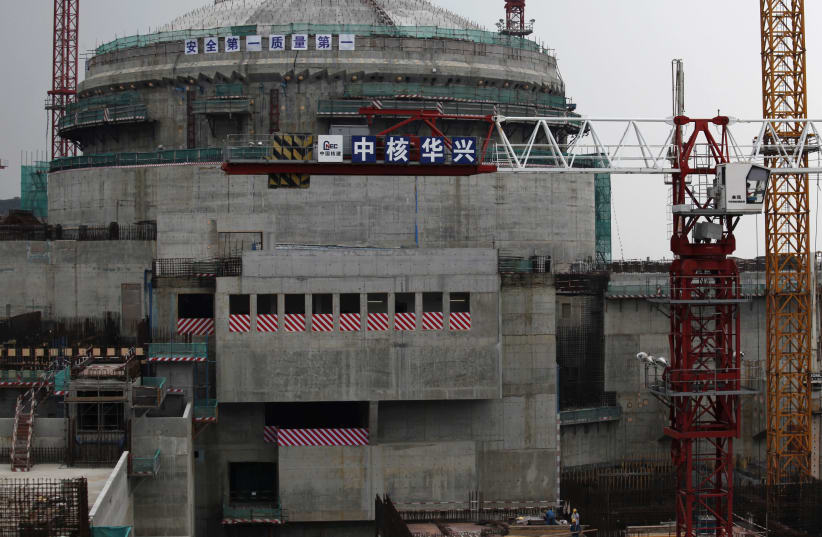A nuclear reactor at China's Taishan nuclear power plant was shut down on Friday, just a week after the French company that helps operate it stated that it would have shut down the plant in France and a month after the company warned of an "imminent radiological threat" at the site.
China General Nuclear Power Group (CGN), the majority owner of the power plant, stated on Friday that a "small amount of fuel damage" had occurred in a reactor at the site, but was still within the "allowable range of technical specification" and the unit could continue operating stably.
"After full communication between Chinese and French technical personnel, Taishan nuclear power plant, in accordance with nuclear safety regulations and nuclear power plant operating procedures, insisted on safety first and conservative decision-making, and decided to shut down unit 1 for maintenance, find the cause of the fuel damage, and replace the damaged fuel," said CGN.
The nuclear energy company stressed that it has maintained "good performance in safe operation" over the past 30 years, maintaining transparency and openness concerning events at the nuclear power plants and surrounding environmental monitoring data.
Électricité de France (EDF), which is a co-owner of the Taishan plant, stated in June that there was a build-up of noble gases at nuclear reactor No. 1, adding that it was a "known phenomenon, studied and provided for in the reactor operating procedures."
CNN reported at the time that the reactor is leaking fission gas, adding that EDF had warned in a letter that the Chinese safety authority has raised regulator "off-site dose limits."
In July, EDF announced in a press release that analysis of the loss of fuel rod sealing at the site indicates that the situation is "evolving."
The company stressed that, in France, it would have shut down the reactor "in order to accurately assess the situation in progress and stop its development," although it did not directly call on China to shut down the Taishan plant. The press release stated that the relevant decisions at Taishan belong to Taishan Nuclear Power Joint Venture Co. (TNPJVC).
EDF owns 30% of TNPJVC. The other 70% is owned by China General Nuclear Power Group (CGN).
Despite the statement that it would have shut down the plant if it was in France, EDF added that the radiochemical parameters at Taishan are still below regulatory thresholds in force at the plant, which it said are consistent with international practices.
In June, CNN reported that EDF had sent a letter to the US Department of Energy warning that the Chinese safety authority was raising the acceptable limits for radiation detection outside the plant in Guangdong province in order to avoid shutting it down.
Framatome, a nuclear reactor company owned by EDF, reached out to the US in order to obtain a waiver that would let them share American technical assistance in order to resolve the issue. The waiver can only be granted for two reasons, one of which is an "imminent radiological threat."
China has denied that there is a leak at the Taishan plant or that it has raised the acceptable limits for radiation detection. China's Atomic Energy Authority (CAEA) has reported that continuous environmental radiation monitoring confirmed that there has been no radiation release and there is no environmental concern.
THE INTERNATIONAL Atomic Energy Agency (IAEA) reported in June that CAEA had updated it that the plant was in "normal condition and that operational safety is guaranteed." The CAEA added that the reactor had experienced a "minor fuel rod cladding failure" which caused increased radioactivity in the unit's primary reactor coolant, saying that this is a "common phenomenon" at the plant.
The IAEA explained that while such failures result in an increase in radioactivity of reactor coolant, the reactor can continue to operate safely as long as levels remain within the normal range of operation. Such failures are a "known and not uncommon occurrence," according to the agency.
This isn't the first time that concerns surrounding the Taishan plant have been raised.
EDF warned in 2016 that design flaws emerged during testing of the European pressurized reactors (EPR) designed by French nuclear firm Areva, which are used at the Taishan plant, according to Radio Free Asia. The amount of radioactive nuclear fuel stored at Taishan is three times of what was stored at the Fukushima plant in Japan, according to RFA.
"There have been so many trust issues, that a lot of people now believe that quality control at this nuclear power plant is below standard," engineer and sustainability campaigner Albert Lai told RFA in 2016. "What's more, the problems are much more serious than we thought they were."
EPRs in other countries have suffered from numerous delays due to a slew of defects, including concerns that they could crack during operation.
The EPR at Taishan was the first one to enter commercial operation. Just a week before it entered operation, however, China’s National Nuclear Safety Administration (NNSA) identified "six major issues" in the reactor, according to a report by the Hong Kong Free Press in 2018.
A number of other issues were reported with the reactor before it began operation, with the NNSA pointing to 20 areas for improvement at Taishan, including pipelines that required frequent repairs due to welding defects, according to the news website.
Jerusalem Post Staff contributed to this report.
